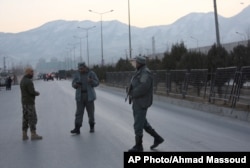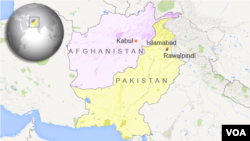Pakistan has called on Afghan leaders to review their “fragmented” approach to peace talks with the Taliban on containing and ending the resilient insurgency, instead of blaming Islamabad for the deteriorating security situation in Afghanistan.
Sartaj Aziz, chief foreign policy advisor to the Pakistani prime minister, in an exclusive interview with VOA, says that a lack of political consensus and prevailing ambiguity in Afghanistan about whether to treat Taliban insurgents as terrorists or stakeholders in national politics has blocked internationally-backed efforts to start peace talks between warring Afghan sides.
“Their approach to talks with the Taliban is very, very fragmented. We want the (Afghan) government of national unity to succeed, to establish its writ, we want them to send a clear signal to the Taliban and other groups that the whole world wants them (insurgents) to talk (to Kabul) and solve the problem because nobody wants fighting in Afghanistan to continue. ,” Aziz told VOA.
The clarity in the Afghan approach coupled with Pakistan’s resolve to prevent the use of its soil against Afghanistan and international pressure may send “right signals” to the Taliban and they may come to the table for peace talks.
“I think they will come under greater pressure and so, if serious negotiations begin in 2017 that will be our best hope for peace in Afghanistan,” Aziz said.
He said that years of reliance on the use of military power to resolve the Afghan conflict has so far not yielded results and instead strengthened the Taliban.
“The Taliban may not be able to capture (the) bulk of Afghanistan or the capital or any other (major urban) place but they can carry on insurgency for a very long time and the people of Afghanistan do need peace as early as possible… In the meanwhile, of course, ISAF (international) forces are trying to help Afghanistan to make sure that they (the Taliban) don’t gain much territory because if they start gaining (more territory) then obviously they will be reluctant to negotiate,” cautioned Aziz.
While the Afghan government controls about two-thirds of the country, the insurgents are in control of roughly 10 percent and the rest is contested, according a U.S. military assessment.
War of words
Continued Taliban battlefield attacks and last week’s deadly bombings in different Afghan cities have refueled a war of words between the two uneasy neighbors.
President Ashraf Ghani has alleged that planners of recent terrorist attacks in his country “live, move freely and recruit people in Pakistan,” a reiteration of a long-running official stance that Taliban sanctuaries on the other side of the border are prolonging the Afghan war.
Pakistani officials refute the charges as unfounded, politically motivated and an attempt to divert attention from internal Afghan problems.
Aziz says Pakistan has repeatedly assured Ghani that space has been squeezed on anti-Afghan insurgents and those hiding on the Pakistani side of the border have mostly gone back to Afghanistan.
“So, that commitment we are gradually honoring. Through operation Zarb-e-Azb, North Waziristan was cleared. The infrastructure of all the terrorist groups was destroyed so they can no longer operate as forcefully and as frequently as they used to but remnants are still scattered. The cleaning up operations are going on,” Aziz said.
He was referring to the military-led counter-terrorism offensive underway in traditionally volatile tribal districts near the Afghan border.
Border security
The de-facto Pakistani foreign minister says his government has also intensified efforts to boost security along its 2,600-kilometer long porous border with Afghanistan. He called for Afghan authorities to make a matching response on their side, saying unlike the decades old tradition of free cross-border movement, travelers are now required to show valid identity documents to move in either direction.
“This (new policy) will enable us to monitor the movement of all kinds of people and so this documentation travel has to be (introduced) on both sides. So far they (Afghanistan) aren’t (implementing it on their side)…and that is the best way to ensure that undesirable elements do not go (to Afghanistan) and this is the only way we can ensure that our commitment of not allowing our soil to be used can be observed,” Aziz asserted.
Allegations that Taliban insurgents operate out of Pakistani safe havens have long strained Pakistan’s relations with the United States, which is leading the international peace and stability efforts in Afghanistan.
Optimistic about Trump
Advisor Aziz, however, sounded upbeat about maintaining “a very constructive and positive” engagement with the incoming Donald Trump administration for achieving what he said was shared peace and security objectives of a peaceful Afghanistan and the region in general.
“So, I think here both U.S. and Pakistan agree that a peaceful solution through negotiations and through an Afghan-led and Afghan-owned process is the way forward. So, we hope that because of this convergence of views on this subject we will be able to move forward together to seek a peaceful solution to the Afghan crisis.”






